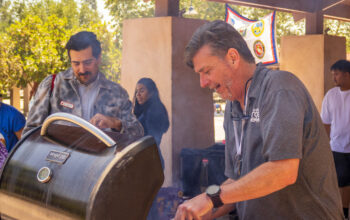Digging into your lineage is like opening doors, each revealing someone who could have been a track star, a military hero or a victim of a historic tragedy.
Umoja helped students unlock those doors through a genealogy event held April 12 in a Library classroom.
Outreach librarian Lisa Valdez hosted the event that showed students how to create their family tree on ancestry.com, and showcased everything she discovered while putting together her own for the past seven years.
“I looked to see how my relatives have died, and it said things like shot, stabbed, strangulation,” Valdez said. “Then I must think about the times I which that they were living, it could have been for any reason. It could have been from racism, but at least it gives you an idea of how these people died. it really makes you think about how we live now and that it is our responsibility to not take for granted what they went through, and what they suffered through.”
Because of the various events happening on campus simultaneously, the turnout was small, but those who did come emphasized its importance.
“There was a lot going on today,” Chaka Hunter, an attendee said. “There was another event my other professor was offering extra credit for, and I was turning in resumes at the job fair, but I didn’t want to miss this, because it is just as important.”
Valdez explains there is a lot to uncover about your family history, and as an example, she details the life of her grandmother.
“I came from a long line of very, very strong women,” Valdez said. “My great grandmother was a nurse and put seven of her nine kids through college. Two of them were track stars, most of them were in the military. Only one female went to the military. She was navy and lived up north where she was a black panther. She also got two Ph.D.’s, one in theology, and one is psychology, and now she’s a thug for Jesus.”
Valdez recalls a personal experience she had when going through her family’s documentations to emphasize how you can discover a lot when you look at your family’s past.
“My mother said when she found her birth certificate, she didn’t know her father wasn’t her father,” Valdez said. “When I found my fathers birth certificate, his father wasn’t his father. So, I told my brother, ‘Did you know that neither one of our granddaddy’s is really our granddaddy?’ He was like, ‘My whole life is a lie,’ I’m like, ‘These people did not raise you, get it together.’”
Another event attendee Rayquan Blizzard, has ancestors from a foreign country, meaning he would have to pay more on ancestry.com to get their information.
“I’m half Japanese and half black,” Blizzard said. “I have a lot of family in Japan, and I have to get their documents from overseas.”
Valdez explains why it is difficult to track down ancestors after a certain point.
“I stopped at my fourth great grandparents, and I cannot go beyond that because then I move into plantations,” Valdez said. “there are just last names, but the family, last name you get is a plantation owners last name. What they do is they keep records of, ‘I have a 9-year-old boy.’ And so, you might have 10 9-year-old boys, and they are listened under last name, and one of those might be your relatives.”
Valdez wants to get funding to pay for students ancestry.com memberships, which can cost up to $99 for 6 months.
“I’m sorry we could not do more with this,” Valdez said. “We are going to try and work on how we can get a grant for this because there are a lot of great things that you can discover about your family, about your ancestry, about where you came from and about the different places your family lived in.”




